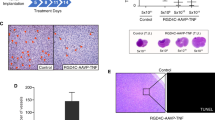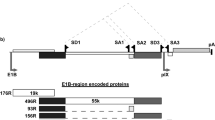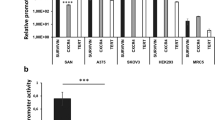Abstract
The Herpes simplex virus 1 (HSV) thymidine kinase (tk) suicide gene together with ganciclovir (GCV) have been successfully used for the in vivo treatment of various solid tumors and for the ablation of unwanted transfused stem cells in recent clinical trials. With the aim of improving this therapeutic system, we compared the potential efficacy of adenoviral (Ad) vectors expressing enhanced tk mutants in vitro and in vivo. The previously created HSV-tk mutants dm30 and sr39, created by random sequence mutagenesis, were inserted into a standard Ad.RSV E1−E3− backbone using homologous recombination. GCV killing of Ad.HSV-tk, Ad.dm30-tk and Ad.sr39-tk was assessed in various tumor cell lines with a cell proliferation assay. Cells expressing the two TK mutants were two-to-five-fold more sensitive to GCV when compared with Ad.HSV-tk transduced cells in all cell lines tested (five human mesotheliomas, one human lung cancer, a human cervical carcinoma, a mouse fibrosarcoma, and a rat glioma line) at equal TK expression levels. Flank tumor models, including cell-mixing studies, assessed the in vivo efficacy of the engineered viruses in BALB/C and SCID mice. In all animal studies, Ad.dm30-tk and Ad.sr39-tk showed more tumor growth inhibition than Ad.HSV-tk when GCV was administered. The use of adenovirus-mediated gene transfer of both tk mutants dm30-tk and sr39-tk for cancer suicide gene therapy should provide a more effective and safer alternative to wild-type HSV-tk.
This is a preview of subscription content, access via your institution
Access options
Subscribe to this journal
Receive 12 print issues and online access
$259.00 per year
only $21.58 per issue
Buy this article
- Purchase on Springer Link
- Instant access to full article PDF
Prices may be subject to local taxes which are calculated during checkout




Similar content being viewed by others
References
Moolten FL . Tumor chemosensitivity conferred by inserted herpes thymidine kinase genes: paradigm for a prospective cancer control strategy. Cancer Res. 1986;46:5276–5281.
Culver KW, Ram Z, Wallbridge S, Ishii H, Oldfield EH, Blaese RM . In vivo gene transfer with retroviral vector-producer cells for treatment of experimental brain tumors. Science. 1992; 256:1550–1552.
Freeman SM, Abboud CN, Whartenby KA, Packman CH, Koeplin DS, Moolten FL, et al. The ‘bystander effect’: tumor regression when a fraction of the tumor mass is genetically modified. Cancer Res. 1993;53:5274–5283.
Albelda SM, Wiewrodt R, Zuckerman JB . Gene therapy for lung disease: hype or hope? Ann Intern Med. 2000;132:649–660.
Smythe WR, Kaiser LR, Hwang HC, Amin KM, Pilewski JM, Eck SJ, et al. Successful adenovirus-mediated gene transfer in an in vivo model of human malignant mesothelioma. Ann Thorac Surg. 1994;57:1395–1401.
Sterman DH, Treat J, Litzky LA, Amin KM, Coonrod L, Molnar-Kimber K, et al. Adenovirus-mediated herpes simplex virus thymidine kinase/ganciclovir gene therapy in patients with localized malignancy: results of a phase I clinical trial in malignant mesothelioma. Hum Gene Ther. 1998;9:1083–1092.
O'Malley Jr BW, Chen SH, Schwartz MR, Woo SL . Adenovirus-mediated gene therapy for human head and neck squamous cell cancer in a nude mouse model. Cancer Res. 1995;55:1080–1085.
Freeman SM, McCune C, Robinson W, Abboud CN, Abraham GN, Angel C, et al. The treatment of ovarian cancer with a gene modified cancer vaccine: a phase I study. Hum Gene Ther. 1995;6:927–939.
Ohno T, Gordon D, San H, Pompili VJ, Imperiale MJ, Nabel GJ, et al. Gene therapy for vascular smooth muscle cell proliferation after arterial injury. Science. 1994;265:781–784.
Cohen JL, Boyer O, Salomon B, Onclercq R, Charlotte F, Bruel S, et al. Prevention of graft-versus-host disease in mice using a suicide gene expressed in T lymphocytes. Blood. 1997;89:4636–4645.
Caruso M, Salomon B, Zhang S, Brisson E, Clavel F, Lowy I, et al. Expression of a Tat-inducible herpes simplex virus-thymidine kinase gene protects acyclovir-treated CD4 cells from HIV-1 spread by conditional suicide and inhibition of reverse transcription. Virology. 1995;206:495–503.
Rainov NG . A phase III clinical evaluation of herpes simplex virus type 1 thymidine kinase and ganciclovir gene therapy as an adjuvant to surgical resection and radiation in adults with previously untreated glioblastoma multiforme. Hum Gene Ther. 2000;11:2389–2401.
Smythe WR, Hwang HC, Amin KM, Eck SL, Davidson BL, Wilson JM, et al. Use of recombinant adenovirus to transfer the herpes simplex virus thymidine kinase (HSVtk) gene to thoracic neoplasms: an effective in vitro drug sensitization system. Cancer Res. 1994;54:2055–2059.
Molnar-Kimber KL, Sterman DH, Chang M, Kang EH, ElBash M, Lanuti M, et al. Impact of preexisting and induced humoral and cellular immune responses in an adenovirus-based gene therapy phase I clinical trial for localized mesothelioma. Hum Gene Ther. 1998;9:2121–2133.
Schwarzenberger P, Harrison L, Weinacker A, Marrogi A, Byrne P, Ramesh R, et al. The treatment of malignant mesothelioma with a gene modified cancer cell line: a phase I study. Hum Gene Ther. 1998;9:2641–2649.
Harrison Jr LH, Schwarzenberger PO, Byrne PS, Marrogi AJ, Kolls JK, McCarthy KE . Gene-modified PA1-Stk cells home to tumor sites in patients with malignant pleural mesothelioma. Ann Thorac Surg. 2000;70:407–411.
Sterman DH, Molnar-Kimber K, Iyengar T, Chang M, Lanuti M, Amin KM, et al. A pilot study of systemic corticosteroid administration in conjunction with intrapleural adenoviral vector administration in patients with malignant pleural mesothelioma. Cancer Gene Ther. 2000;7:1511–1518.
Klatzmann D, Valery CA, Bensimon G, Marro B, Boyer O, Mokhtari K, et al. A phase I/II study of herpes simplex virus type 1 thymidine kinase ‘suicide’ gene therapy for recurrent glioblastoma. Study Group on Gene Therapy for Glioblastoma. Hum Gene Ther. 1998;9:2595–2604.
Trask TW, Trask RP, Aguilar-Cordova E, Shine HD, Wyde PR, Goodman JC, et al. Phase I study of adenoviral delivery of the HSV-tk gene and ganciclovir administration in patients with current malignant brain tumors. Mol Ther. 2000;1:195–203.
Shand N, Weber F, Mariani L, Bernstein M, Gianella-Borradori A, Long Z, et al. A phase 1–2 clinical trial of gene therapy for recurrent glioblastoma multiforme by tumor transduction with the herpes simplex thymidine kinase gene followed by ganciclovir. GLI328 European–Canadian Study Group. Hum Gene Ther. 1999;10:2325–2335.
Alvarez RD, Gomez-Navarro J, Wang M, Barnes MN, Strong TV, Arani RB, et al. Adenoviral-mediated suicide gene therapy for ovarian cancer. Mol Ther. 2000;2:524–530.
Hasenburg A, Tong XW, Rojas-Martinez A, Nyberg-Hoffman C, Kieback CC, Kaplan A, et al. Thymidine kinase gene therapy with concomitant topotecan chemotherapy for recurrent ovarian cancer. Cancer Gene Ther. 2000;7:839–844.
Shalev M, Kadmon D, Teh BS, Butler EB, Aguilar-Cordova E, Thompson TC, et al. Suicide gene therapy toxicity after multiple and repeat injections in patients with localized prostate cancer. J Urol. 2000;163:1747–1750.
Herman JR, Adler HL, Aguilar-Cordova E, Rojas-Martinez A, Woo S, Timme TL, et al. In situ gene therapy for adenocarcinoma of the prostate: a phase I clinical trial. Hum Gene Ther. 1999;10:1239–1249.
Morris JC, Ramsey WJ, Wildner O, Muslow HA, Aguilar-Cordova E, Blaese RM . A phase I study of intralesional administration of an adenovirus vector expressing the HSV-1 thymidine kinase gene (AdV.RSV-tk) in combination with escalating doses of ganciclovir in patients with cutaneous metastatic malignant melanoma. Hum Gene Ther. 2000;11:487–503.
Lambright ES, Amin K, Wiewrodt R, Force SD, Lanuti M, Propert KJ, et al. Inclusion of the herpes simplex thymidine kinase gene in a replicating adenovirus does not augment antitumor efficacy. Gene Ther. 2001;8:946–953.
Douglas JT, Rogers BE, Rosenfeld ME, Michael SI, Feng M, Curiel DT . Targeted gene delivery by tropism-modified adenoviral vectors. Nat Biotechnol. 1996;14:1574–1578.
Black ME and Loeb LA . Random sequence mutagenesis for the generation of active enzymes. Methods Mol Biol. 1996;57:335–349.
Black ME, Kokoris MS, Sabo P . Herpes simplex virus-1 thymidine kinase mutants created by semi-random sequence mutagenesis improve prodrug-mediated tumor cell killing. Cancer Res. 2001;61:3022–3026.
Kokoris MS, Sabo P, Adman ET, Black ME . Enhancement of tumor ablation by a selected HSV-1 thymidine kinase mutant. Gene Therapy 1999;6:1415–1426.
Kokoris MS, Sabo P, Black ME . In vitro evaluation of mutant HSV-1 thymidine kinases for suicide gene therapy. Anti Cancer Res. 2000;20:959–963.
Qiao J, Black ME, Caruso M . Enhanced ganciclovir killing and bystander effect of human tumor cells transduced with a retroviral vector carrying a herpes simplex virus thymidine kinase gene mutant. Hum Gene Ther. 2000;11:1569–1576.
Pantuck AJ, Matherly J, Zisman A, Nguyen D, Berger F, Gambhir SS, et al. Optimizing prostate cancer suicide gene therapy using herpes simplex virus thymidine kinase active site variants. Hum Gene Ther. 2002;13:777–789.
Lanuti M, Gao GP, Force SD, Chang MY, El Kouri C, Amin KM, et al. Evaluation of an E1E4-deleted adenovirus expressing the herpes simplex thymidine kinase suicide gene in cancer gene therapy. Hum Gene Ther. 1999;10:463–475.
Engelhardt JF, Yang Y, Stratford-Perricaudet LD, Allen ED, Kozarsky K, Perricaudet M, et al. Direct gene transfer of human CFTR into human bronchial epithelia of xenografts with E1-deleted adenoviruses. Nat Genet. 1993;4:27–34.
Elshami AA, Saavedra A, Zhang H, Kucharczuk JC, Spray DC, Fishman GI, et al. Gap junctions play a role in the ‘bystander effect’ of the herpes simplex virus thymidine kinase/ganciclovir system in vitro. Gene Ther. 1996;3:85–92.
Black ME and Loeb LA . Identification of important residues within the putative nucleoside binding site of HSV-1 thymidine kinase by random sequence selection: analysis of selected mutants in vitro. Biochemistry. 1993;32:11618–11626.
Gambhir SS, Bauer E, Black ME, Liang Q, Kokoris MS, Barrio JR, et al. A mutant herpes simplex virus type 1 thymidine kinase reporter gene shows improved sensitivity for imaging reporter gene expression with positron emission tomography. Proc Natl Acad Sci USA. 2000;97:2785–2790.
Acknowledgements
This research was supported by the Mildred Scheel Stiftung für Krebsforschung der Deutschen Krebshilfe e.V. (Postdoctoral fellowship D/98/02288 to RW), by grants from the National Cancer Institute (NCI PO1 66726 to SMA, KA, LRK and SPORE grant P50-CA-83638 and CA85939 to MEB), and support provided by the Benjamin Shein Foundation for Humanity to SMA. We thank Dr Kathleen Joy Propert, University of Pennsylvania, for statistical advice.
Author information
Authors and Affiliations
Corresponding author
Rights and permissions
About this article
Cite this article
Wiewrodt, R., Amin, K., Kiefer, M. et al. Adenovirus-mediated gene transfer of enhanced Herpes simplex virus thymidine kinase mutants improves prodrug-mediated tumor cell killing. Cancer Gene Ther 10, 353–364 (2003). https://doi.org/10.1038/sj.cgt.7700589
Received:
Published:
Issue Date:
DOI: https://doi.org/10.1038/sj.cgt.7700589
Keywords
This article is cited by
-
The Combinatorial Effect of Ad-IL-24 and Ad-HSV-tk/GCV on Tumor Size, Autophagy, and UPR Mechanisms in Multiple Myeloma Mouse Model
Biochemical Genetics (2024)
-
Guanosine-based antiviral acyclovir incorporated in ring-opening polymerization of ɛ-caprolactone
Macromolecular Research (2013)
-
Neoadjuvant in situ gene-mediated cytotoxic immunotherapy improves postoperative outcomes in novel syngeneic esophageal carcinoma models
Cancer Gene Therapy (2011)
-
The carcinoma-specific epithelial glycoprotein-2 promoter controls efficient and selective gene expression in an adenoviral context
Cancer Gene Therapy (2006)
-
Genetic strategies for brain tumor therapy
Cancer Gene Therapy (2006)



